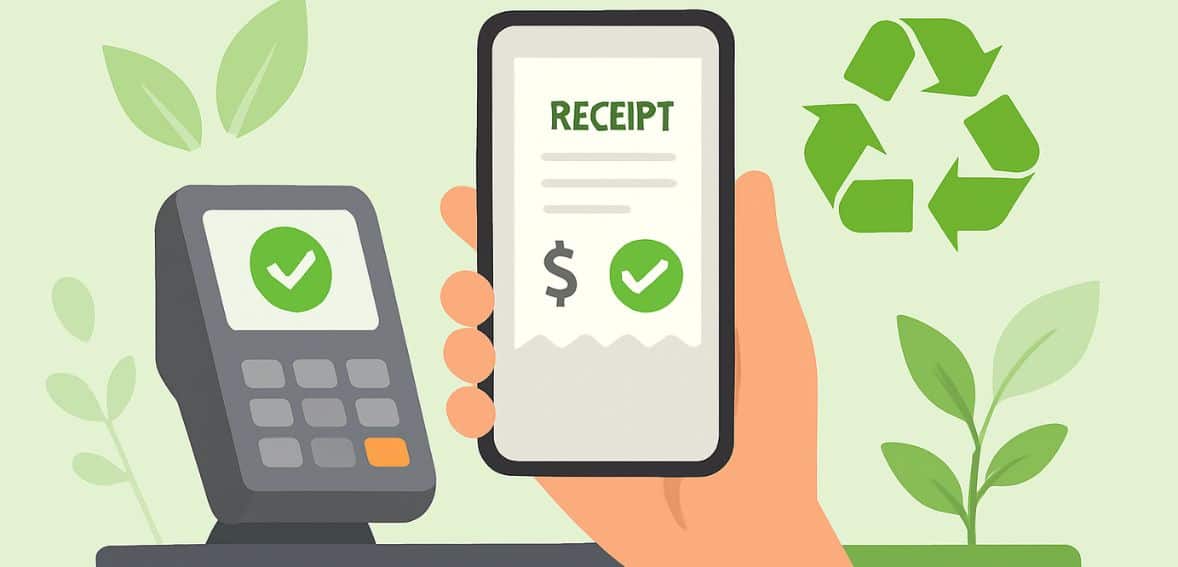
By alphacardprocess September 18, 2025
Over the past ten years, there has been a significant shift in how people shop and pay for goods, with a greater concern for the environment at its core. At checkout, modern customers want options that align with their values in addition to speed and convenience.
Customers who care about sustainability are looking for eco-friendly products that minimize environmental damage and cut down on waste. This vision is no longer compatible with paper receipts, disorganized printing procedures, and antiquated checkout techniques.
Rather, companies are adopting paperless checkout systems that combine efficiency, technology, and accountability into a single, smooth procedure. In a world that values sustainability, going paperless is becoming essential to meeting customer expectations rather than a nice-to-have feature for both large retailers and small boutiques.
The Rise of the Paperless Movement

From being a specialized trend, sustainability is now a major factor influencing consumer behavior. The majority of consumers, according to reports, favor companies that exhibit environmental responsibility. Due to this change, companies are no longer able to overlook the minor details that reveal their sustainability policies.
Even something as basic as switching from paper to digital receipts has both practical and symbolic significance. It addresses practical concerns like waste management and the price of paper, ink, and storage while also demonstrating a brand’s dedication to lessening its environmental impact.
Paperless checkouts are about rethinking how transactions take place in the digital age, not just about being environmentally friendly. Imagine this: a client just had the most amazing hair treatment or a relaxing massage. They’re glowing and feeling pampered — they’re then told to go wait in line, fumble for their card, or negotiate a clumsy tipping screen that kills the vibe. It is time for salons, more than you might guess.
Smart payment terminals do more than just process payments; they accelerate transactions, simplify tipping, and enable payment right in the chair, ensuring the high-end service doesn’t end at checkout.
Why Traditional Receipts No Longer Work
Receipts have been considered an essential component of proof of purchase for many years. However, the majority of paper receipts are printed on thermal paper that has been chemically coated, making recycling them challenging.
Each year, millions of tons of these receipts wind up in landfills, contributing to pollution and waste. Beyond environmental issues, paper receipts are frequently viewed as inconvenient by consumers due to their loss, fading, and tendency to clog wallets or purses.
Businesses incur continuous costs for paper, ink, and printer maintenance when they print receipts. The conventional receipt model is out of date due to its numerous shortcomings, and environmentally conscious customers are demanding better options.
The Psychology of a Paperless Experience
Simplicity appeals to customers in a natural form. When paper is removed from checkout, physical clutter is decreased, and a sense of calm is created. Clients leave feeling relieved rather than having been given something they will probably throw away. Their impression of the brand as modern and customer-focused is reinforced by this psychology.
The lack of needless paper reflects the minimalist, eco-friendly, and technologically advanced lifestyle that customers desire in today’s fast-paced, convenience-driven society. Companies that recognize this emotional component of shopping build closer relationships with their environmentally conscious customer base.
Digital Receipts as a Sustainable Solution

Digital receipts have become a revolutionary substitute. Businesses can use text or app notifications to deliver receipts straight to a customer’s email or mobile device, eliminating the need to hand them a piece of paper.
Customers can handle their purchases in a cleaner, more organized manner because of this minor adjustment, which also significantly reduces the amount of paper used. The worry of losing paper evidence of purchase is also removed with digital receipts, which facilitate simple returns and improved record-keeping.
Businesses can reduce expenses and demonstrate to customers that sustainability is important in all facets of their offerings by implementing digital options.
How Paperless Checkout Enhances Mobile Wallets
Paperless checkout has flourished due to the quick uptake of mobile wallets like Apple Pay, Google Pay, and Samsung Pay. Receipts automatically match the same platform when payments are made digitally. Customers instantly receive confirmations, which are saved in the apps they already use daily, along with their purchase history.
In addition to cutting waste, this degree of integration improves the transaction experience overall by making it seamless, interconnected, and very accessible. Businesses leverage consumer habits by tying the use of mobile wallets to paperless receipts, making sustainability the norm rather than an optional extra.
Aligning Checkout with Customer Values
Customers of today are very sensitive to brand ethics. They invest in values rather than just goods. A checkout process that accepts paperless options shows customers that a company is responsive to their needs and wants to change with them. Trust and loyalty are increased by this alignment.
Customers are more likely to support a business when they notice that their favorite café, clothes store, or spa has done away with paper waste at checkout. These minor details can help a brand stand out in a crowded market over time and establish itself as a leader in both responsibility and convenience.
Generational Demand for Sustainability
Sustainability is a top priority for Gen Z and Millennials, who currently control the majority of consumer markets. They actively select brands with the least negative effects on the environment and quickly reject those that are thought to be antiquated or wasteful.
By demonstrating that companies share their values, paperless checkout directly appeals to these groups. For these clients, eco-friendly practices are expected rather than optional. Businesses can stay relevant to the generations influencing the direction of commerce by implementing paperless systems.
Shaping Long-Term Customer Loyalty

Price and convenience are no longer the only factors that influence customer loyalty. Nowadays, customers consider sustainability when determining which establishments deserve return business.
A paperless checkout shows that a business is forward-thinking and sensitive to customer needs. Consumers feel more connected when their shopping experience reflects their environmental values. Because it is linked to more profound identity-driven decisions, this loyalty is frequently more durable than sales or discounts.
Businesses demonstrate their concern for the future of the world as well as for today’s sales by eliminating paper waste from transactions. Long-term, values-based loyalty that is difficult for rivals to replace is established by this strategy.
Cost Savings and Operational Benefits
The financial advantages that paperless checkout offers businesses are among its most underappreciated features. Paper rolls, ink cartridges, printers, and even the labor required to manage them are all hidden expenses that mount up over time when printing paper receipts.
Businesses can reduce these ongoing costs and free up employees to handle printer jams and supply replacements during peak hours by implementing digital receipts. Shorter wait times, more seamless transactions, and a more polished atmosphere are all results of this efficiency. The money saved can then be used for other sustainability projects or to enhance the customer experience.
Reducing Waste Beyond the Checkout Counter
Despite their seemingly insignificant size, paper receipts have a significant impact when combined with other types of transactional waste. Consider instances where companies have historically used printed paper for things like shipping labels, appointment reminders, and membership confirmations.
Businesses can drastically cut waste across a variety of touchpoints by putting in place systems that transmit these digitally. Reductions in raw material consumption, production energy waste, and disposal costs for businesses and communities have a significant knock-on effect.
A paperless checkout system frequently serves as the starting point for more comprehensive waste-reduction plans, demonstrating how one modification can spur a thorough reevaluation of operational sustainability. This promotes efficiency and supports international initiatives to reduce environmental impact.
The Role of Technology In Driving Change
Paperless checkout technology has advanced to become more dependable, reasonably priced, and simple to use. Digital receipts can now be sent directly by text or email because of built-in features in point-of-sale (POS) systems.
Paper is further eliminated by the seamless integration of mobile wallets and contactless payment platforms with these systems. Additionally, cloud-based POS systems safely store transaction data so that customers can view their past purchases at any time. The goal of this tech-driven change is to make the checkout process more innovative and efficient, not just to replace paper.
Training Employees for Seamless Adoption
Introducing paperless checkout requires more than just technology—it requires employee readiness. Staff need to understand the value of digital receipts so they can confidently explain options to customers.
Training helps employees handle questions such as where the receipt is stored or how to access it later. When employees communicate clearly and highlight the sustainability benefits, customers feel reassured and are more likely to embrace the change. A well-trained team ensures the transition feels smooth and aligned with customer expectations.
Overcoming Resistance to Change
Despite its benefits, some companies are hesitant to implement paperless checkout because they are concerned about customer complaints or technical difficulties. In actuality, though, the majority of customers are already accustomed to getting digital confirmations for reservations at events, airline tickets, and online purchases.
Many people find it easy to apply this familiarity to in-store transactions. By allowing customers to select digital receipts while maintaining paper options for those who would rather use them, businesses can facilitate the transition. The demand for paper will eventually decline as customers realize how convenient it is, and digital adoption will naturally increase.
Addressing Customer Privacy Concerns
Privacy concerns are one of the reasons why some customers are reluctant to accept digital receipts. They are concerned that giving their phone number or email address could expose them to unannounced marketing.
Companies need to respond to this by being open and considerate. Trust is increased by making it clear that information will only be used for receipts, unless the customer chooses to participate in promotions.
Providing a variety of choices, like app-based receipts or QR-code downloads, also reassures clients. Responsible privacy management transforms possible hesitancy into confidence, enhancing enduring bonds.
Building Stronger Customer Relationships

Paperless checkout also opens new opportunities for customer engagement. Digital receipts can include personalized messages, special offers, or loyalty program details. This transforms a simple transaction into an ongoing conversation between business and client.
Instead of throwing away a paper slip, the customer interacts with a branded digital receipt that adds value to their experience. This strengthens relationships while reinforcing the business’s commitment to sustainability and innovation.
Environmental Impact Beyond Receipts
Going paperless at checkout has ripple effects that go beyond eliminating receipts. It reduces the demand for paper production, which means fewer trees are cut down and less energy is consumed in manufacturing. It lowers the use of inks and chemicals that are harmful to the environment.
It also cuts down on the carbon footprint associated with transporting paper supplies. Each digital receipt may seem small, but collectively, they contribute to significant environmental savings when adopted at scale. Businesses that understand this broader impact can share it with clients, making them active participants in sustainability efforts.
Scaling Paperless Practices Across Industries
Although paperless checkout is frequently adopted first in retail and cafés, the idea is quickly spreading throughout other industries. Digital transaction confirmations are being adopted by utility companies, gyms, salons, and healthcare providers.
Customers expect paperless interactions in all facets of their lives, not just when they shop. Companies that implement this strategy across industries help bring about a broader cultural change where sustainable, paperless procedures are accepted as the norm rather than the exception.
Meeting Regulatory and Industry Trends

In addition to being a consumer demand, sustainability is also becoming a more important regulatory priority. Greener practices are being promoted in all sectors by governments and business associations.
Businesses can stay ahead of compliance regulations and establish themselves as progressive leaders by introducing paperless checkout as soon as possible. Additionally, this proactive approach shows stakeholders, including employees and investors, that the company takes environmental responsibility seriously.
Conclusion
More than just a passing trend, the move to eco-friendly, paperless checkout is a reflection of a global trend toward sustainability and more intelligent business practices. For customers who have strong environmental concerns, this shift shows that a company is open to feedback and adaptation.
Businesses benefit from lower costs, more effective operations, and improved client relations. By adopting paperless systems, businesses are actively influencing a future in which sustainability and commerce coexist, rather than merely meeting modern needs. Eliminating paper waste at checkout becomes a significant step toward creating a greener, more responsible economy in a time when every decision matters.